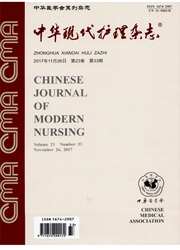

 中文摘要:
中文摘要:
目的探讨院外延续护理干预对首发精神分裂症患者康复效果的影响,为开展院外延续护理提供依据。方法将120例首发精神分裂症患者按随机数字表法分为研究组和对照组各60例。两组患者出院时均接受精神科常规治疗、护理及出院指导,随访1年。研究组在此基础上分两个阶段实施院外延续护理干预,对照组不作干预。记录两组患者服药依从性、疾病复发和再就业情况,在患者出院后半年及1年两个时段,采用简明精神症状量表(BPRS)、生活质量综合评定问卷(GQOLI-74)对其进行评估。结果研究组患者有39例能遵医嘱按时按量服药,对照组为26例;研究组患者有7例复发,对照组有17例;研究组患者有13例已就业,对照组有4例,两组比较差异有统计学意义(x。分别为5.673,5.208,5.551;P〈0.05);院外延续护理开始前,研究组患者BPRS评分与对照组患者比较,差异无统计学意义(P〉0.05);院外延续护理实施后,研究组患者BPRS评分总分为(54.34±6.608)分,高于对照组(43.63±5.47)分,两组比较差异有统计学意义(t=6.749,P〈0.01);研究组患者1年后EQOLI-74评分为,躯体功能(62.14±7.16)分、心理功能(61.54±7.14)分、社会功能(60.42±5.28)分,均高于对照组(62.14±7.16)、(61.54±7.14)、(60.42±5.28)分,两组比较差异有统计学意义(t分别为3.304,3.259,3.959;P〈0.01)。结论院外延续护理能促进精神分裂症患者自我照顾能力,减缓患者的功能衰退,减少复发率,提高生活质量,促进患者早日康复,重返社会。。
 英文摘要:
英文摘要:
Objective To explore the effect of continue nursing out of hospital on the rehabilitation patients with first onset schizophrenia and to provide theoretical guidance for the development of hospital extended care. Methods Totals of 120 patients with first onset schizophrenia were randomly divided into study group and control group, each group 60 cases. Study group received continue nursing interventions out of hospital in two stages, control group only received conventional treatment, nursing, discharge instruction, and followed up one year. Medication compliance, disease recurrence and reemployment of patients were recorded. After patients discharged six months and one year, they were investigated with Brief psychotic symptoms scale (BPRS) and comprehensive assessment of quality of life questionnaire (GQOLI-74). Resnits In study group, there was 39 patients complied doctors' advice, 7 patients' disease recurred and 13 patients were reemployment,while 26 patients complied doctors' advice, 17 patients' disease recurred and 4 patients were reemployment in control group, and the differences were statistically significant (~2 = 5. 673,5. 208,5. 551, respectively;P〈0.05). There was no significant difference on the BPRS scores in two groups before implemented continue nursing outside hospital ( P 〉 0. 05 ) ; while after implemented continue nursing, the total score of BPRS in study group was ( 54. 34±6. 608 ) higher than (43.63 ±5.47 ) in control group, and the differences were statistically significant( t =6. 749, P 〈 0. 01 ). One year later, the EQOL-74 score in physical function ( 62.14±7.16), psychological function ( 61.54±7.14) and social function ( 60.42±5.28 ) in study group were higher than that of control group that was ( 62.14 ±7. 16 ), ( 61.54±7. 14 ), ( 60.42±5.28 ) respectively, and the differences were statistically significant ( t = 3. 304,3. 259,3.959, respectively; P 〈 0. 01 ). Comparison of medication compliance, and ratio
 同期刊论文项目
同期刊论文项目
 同项目期刊论文
同项目期刊论文
 期刊信息
期刊信息
